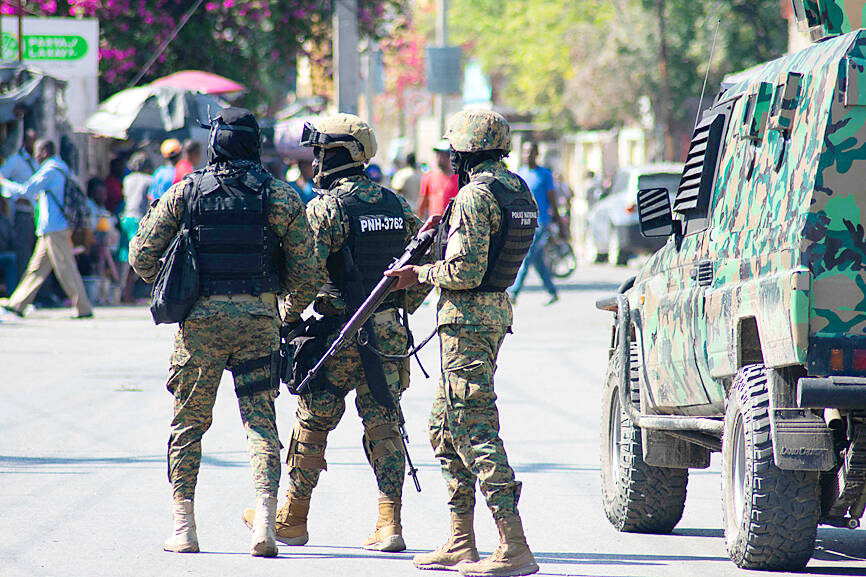The Taiwanese embassy in Haiti has no immediate plan to evacuate Taiwanese from the Caribbean ally, but it has contingencies prepared in case evacuation becomes necessary amid escalating violence in the country, the Ministry of Foreign Affairs said yesterday.
The ministry released the statement in response to media inquiries whether Taiwan plans to evacuate diplomatic staff and citizens in Haiti after the US, Germany and the EU decided to do so after the latest incidents last week.
Violence broke out late last month while Haitian Prime Minister Ariel Henry was visiting Kenya to advocate for the deployment of a UN-backed police force to combat Haitian gangs.

Photo: AFP
Since then, criminal gangs have taken control of much of the capital, Port-au-Prince, and attacked key infrastructure, including two prisons where most of its 3,800 inmates escaped.
The Taiwanese embassy in Haiti remains open, and 24 Taiwanese in Haiti — comprising embassy staff, technical mission members, businesspeople and their families — are safe, the ministry said.
Given the ongoing chaos in Haiti, it would be safer for Taiwanese to stay where they are for now instead of fleeing to other places, it said.
Other than the US airlifting nonessential embassy personnel from Haiti and the evacuation of the German ambassador and EU diplomatic staff, other countries with embassies in Haiti currently do not have immediate evacuation plans, it said.
The Taiwanese embassy in Haiti has since 2021 beefed up security, hiring more private guards and installing more advanced security systems to protect diplomatic staff, it added.
Contingencies are ready in case a decision is made to evacuate citizens from Haiti, it said without elaborating.
Haiti declared a state of emergency and imposed a curfew last week in response to a deadly surge of gang violence overwhelming its capital, beginning on Feb. 29.
The ongoing unrest was confined to the center of Port-au-Prince and the city’s airport in neighboring the Tabarre commune, about 10km from the Taiwanese embassy, the ministry said.
As the embassy is in the suburban Port-au-Prince commune of Petion-Ville, it has been largely unaffected by the unrest, it said.

Chinese spouse and influencer Guan Guan’s (關關) residency permit has been revoked for repeatedly posting pro-China videos that threaten national security, the National Immigration Agency confirmed today. Guan Guan has said many controversial statements in her videos posted to Douyin (抖音), including “the red flag will soon be painted all over Taiwan” and “Taiwan is an inseparable part of China,” and expressing hope for expedited reunification. The agency last year received multiple reports alleging that Guan Guan had advocated for armed reunification. After verifying the reports, the agency last month issued a notice requiring her to appear and explain her actions. Guan

The Kaohsiung Tourism Bureau audited six hotels in an effort to prevent price gouging ahead of Korean band BTS’ concert tour in the city scheduled for Nov. 19, 21 and 22 this year. The bureau on Friday said that the audits — conducted in response to allegations of unfair pricing posted on social media — found no wrongdoing. These establishments included the local branches of Chateau de Chine, Hotel Nikko, My Humble House, and Grand Hai Lai, it said, adding that the Consumer Protection Commission would have penalized price gougers had the accusations been substantiated. The bureau said the Tourism Development Act

GIVE AND TAKE: Blood demand continues to rise each year, while fewer young donors are available due to the nation’s falling birthrate, a doctor said Blood donors can redeem points earned from donations to obtain limited edition Formosan black bear travel mugs, the Kaohsiung Blood Center said yesterday, as it announced a goal of stocking 20,000 units of blood prior to the Lunar New Year. The last month of the lunar year is National Blood Donation Month, when local centers seek to stockpile blood for use during the Lunar New Year holiday. The blood demand in southern Taiwan — including Tainan and Kaohsiung, as well as Chiayi, Pingtung, Penghu and Taitung counties — is about 2,000 units per day, the center said. The donation campaign aims to boost

BACK TO WINTER: A strong continental cold air mass would move south on Tuesday next week, bringing colder temperatures to northern and central Taiwan A tropical depression east of the Philippines could soon be upgraded to be the first tropical storm of this year, the Central Weather Administration (CWA) said yesterday, adding that the next cold air mass is forecast to arrive on Monday next week. CWA forecaster Cheng Jie-ren (鄭傑仁) said the first tropical depression of this year is over waters east of the Philippines, about 1,867km southeast of Oluanpi (鵝鑾鼻), and could strengthen into Tropical Storm Nokaen by early today. The system is moving slowly from northwest to north, and is expected to remain east of the Philippines with little chance of affecting Taiwan,